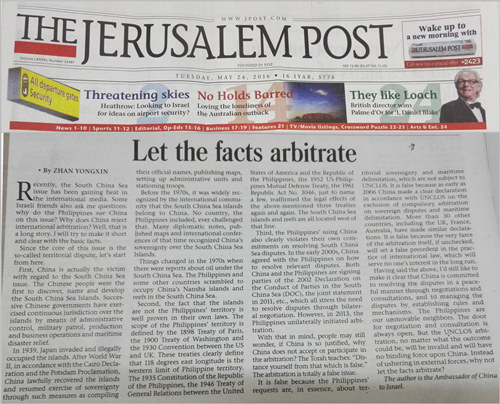On May 24th, 2016, The Jerusalem Post, Israel's largest-circulation English newspaper, published Ambassador Zhan Yongxin's Article Entitled "Let the Facts Arbitrate". The full text is as follows:

Recently, the South China Sea issue is gaining heat in the international media. Some Israeli friends also ask me questions: why do the Philippines sue China on this issue? Why does China reject the international arbitration? Well, that is a long story. I will try to make it short and clear with the basic facts.
Since the core of this issue is the so-called territorial dispute, let's start from here.
First, China is actually the victim with regards to the South China Sea issue. The Chinese people were the first to discover, name and develop the South China Sea Islands. Successive Chinese governments have exercised continuous jurisdiction over the islands by means of administrative control, military patrol, production and business operations and maritime disaster relief.
In 1939, Japan invaded and illegally occupied the islands. After World War II, in accordance with the Cairo Declaration and the Potsdam Proclamation, China lawfully recovered the islands and resumed exercise of sovereignty through such measures as compiling their official names, publishing maps, setting up administrative units and stationing troops.
Before the 1970s, it was widely recognized by the international community that the South China Sea islands belong to China. No country, the Philippines included, ever challenged that. Many Diplomatic Notes, published maps, international conferences of that time recognized China's sovereignty over the South China Sea Islands.
Things changed in the 1970s when there were reports about oil under the South China Sea. The Philippines and some other countries scrambled to occupy China's Nansha islands and reefs in the South China Sea.
Second, the fact that the islands are not the Philippines' territory is well proven in their own laws. The scope of the Philippines' territory is defined by the 1898 Treaty of Paris, the 1900 Treaty of Washington and the 1930 Convention between the US and UK. These treaties clearly define that 118 degrees east longitude is the western limit of Philippine territory. The 1935 Constitution of the Republic of the Philippines, the 1946 Treaty of General Relations between the United States of America and the Republic of the Philippines, the 1952 U.S.-Philippines Mutual Defense Treaty, the 1961 Republic Act No.3046, just to name a few, reaffirmed the legal effects of the above-mentioned three treaties again and again. The South China Sea islands and reefs are all located west of that line.
Third, the Philippines' suing China also clearly violates their own commitments on resolving South China Sea disputes. In the early 2000's, China agreed with the Philippines on how to resolve relevant disputes. Both China and the Philippines are signing parties of the 2002 Declaration on the Conduct of Parties in the South China Sea (DOC), the joint statement in 2011, etc., which all stress to resolve disputes through bilateral negotiation. However, in 2013, the Philippines unilaterally initiated arbitration.
With that in mind, people may still wonder, if China is so justified, why China does not accept or participate in the arbitration. The Torah teaches "Distance yourself from that which is false." The arbitration is totally a false issue.
It is false because that the Philippines' requests are, in essence, about territorial sovereignty and maritime delimitation, which are not subject to UNCLOS. It is false because that as early as in 2006 China made a clear declaration in accordance with UNCLOS to exclude compulsory arbitration on sovereign disputes and maritime delimitation. More than 30 other countries, including the UK, France, Australia, have made similar declarations. It is false because the very farce of the arbitration itself, if unchecked, will set a false precedent in the practice of international law, which will serve no one's interest in the long run.
Having said the above, I'd still like to make it clear that China is committed to resolving the disputes in a peaceful manner through negotiations and consultations, and to managing the disputes by establishing rules and mechanisms. The Philippines are our unmovable neighbors. The door for negotiation and consultation is always open. But the UNCLOS arbitration, no matter what the outcome could be, will be invalid and will have no binding force upon China. Instead of ushering in external forces, why not let the facts arbitrate?